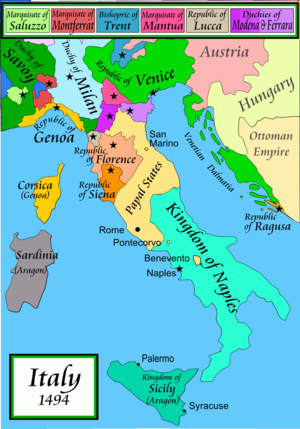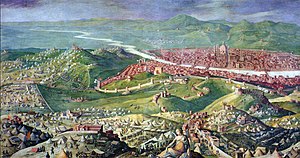
This timeline lists important events relevant to the life of the Italian diplomat, writer and political philosopher Niccolò di Bernardo dei Machiavelli (1469–1527).
Contents
Machiavelli was born in Florence in 1469 of an old citizen family. Little is known about his life until 1498, when he was appointed secretary and second chancellor to the Florentine Republic. [1] During his time of office his journeys included missions to Louis XII of France and to the Holy Roman Emperor Maximillian I; he was with Cesare Borgia in the Romagna; and after watching the second Papal election of 1503 he accompanied Pope Julius II on his first campaign of conquest. In 1507, as chancellor of the newly appointed Nove di Milizia (Nine of the Militia), he organised an infantry force which fought at the capture of Pisa in 1509. [1] Three years later it was defeated by the Holy League at Prato, the Medici returned to Florence, and Machiavelli was excluded from public life. After suffering imprisonment and torture, he retired to his farm near San Casciano, where he lived with his wife and six children and gave his time to study and writing. His works included The Prince ; the Discourses on the First Decade of Livy ; The Art of War and the comedy, Mandragola , a satire on seduction. In 1520, Cardinal Giulio de' Medici (later Pope Clement VII, 1523) secured him a commission to write a history of Florence, which he finished in 1525. After a brief return to public life, he died in 1527. [1]



